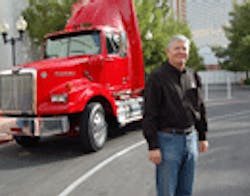LAS VEGAS. Many might think Michael Jackson, newly installed general manager of Western Star Trucks Inc., has the most unenviable of jobs: reviving a truck brand some have given up for dead.
Jackson, however, doesn’t see it that way, and at a special ride-and-drive event for the trucking media held in conjunction with the OEM’s annual dealer meeting, he and his new executive team laid out the reasons why Western Star may yet have a very profitable future within the Daimler Truck North America (DTNA) family of brands, which includes Freightliner. (Photos gallery from Western Star)
“There are those that insist Western Star’s days are numbered, but I believe we can chart a new course for this brand, a successful and profitable one,” he said. “Yes, our market share is very small, but when you break down that share by vocational segments and in Canada, the numbers paint a very different picture.”
Ann Demitruk, Western Star’s director of marketing, noted that within specific trucking segments such as mining, construction, forest products, oil and energy, and heavy wreckers, Western Star’s market share ranges from 25% to 28%. The brand also sells well in Canada, where the trucks used to be built before being bought by Germany’s Daimler AG in July 2000 and relocated to Freightliner’s then-headquarters in Portland, OR. (See videos from Western Star Pt. 1, Pt. 2, Pt. 3)
“We still believe there’s room to grow in this market, and that there is still a big market for premium trucks -- just look at the continued success of Paccar’s brands [Peterbilt and Kenworth] and Mack Trucks,” Demitruk said. “We believe the key going forward will be getting more customers and prospects into our trucks.”
Jackson said the revitalization plan for Western Star incorporates several elements. First, DTNA will keep building Western Star products at its plant in Portland, OR, instead of relocating production to DTNA-owned facilities in Mexico, a move the parent company considered for a time.
Secondly, Western Star will now be managed as a separate organization within the DTNA group, with its own executive team and R&D resources.
Thirdly, the company plans to forge closer links with its dealership network – such as holding quarterly meetings with dealers to review sales progress and issues – to help beef up customer service levels.
Finally, as Western Star completes product adaption to comply with 2010engine emission rules, new directions will be plotted to incorporate aerodynamics and other fuel-saving design efforts, Jackson said.
“At the top of our mind is the need for aerodynamic packages and lighter [tare] weights to be more competitive in the on-highway fleet market,” he said. “We’re looking at everything.”
Richard Shearing, DTNA director of product planning added that Western Star will follow a “phased” approach to 2010 emissions compliance. As of Jan. 1, applicable on-highway Western Star models will be available with 2010-certififed engines from its sister company Detroit Diesel Corp. (DDC). Cummins 2010-compliant engines will be offered a little later, in the first quarter of next year, with specialty vehicles available with 2010 engines by June or July.
“Getting these engines and 2010 aftertreatment systems packaged onto highly customized vehicles is proving to be a challenge from an engineering standpoint, but one we’re handling so we minimize the impact on them,” Shearing said.
“There’s a renewed sense of urgency for the Western Star brand, but I will tell you, DTNA is behind it for the long haul,” Jackson said. “Now, in this down economy, it can be easy to see the glass as half empty. I’ll also tell you I’m no Pollyanna – I’m a former accountant, after all. But I think we can provide a good quality product, backed by dealer support, to help rebuild this winning brand. Our customers go anywhere, do anything, and ‘get it done.’ We must do the same.”
About the Author
Sean Kilcarr
Editor in Chief
Sean Kilcarr is a former longtime FleetOwner senior editor who wrote for the publication from 2000 to 2018. He served as editor-in-chief from 2017 to 2018.
